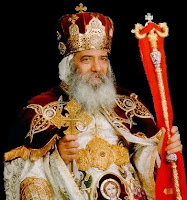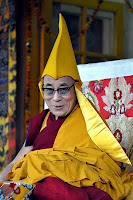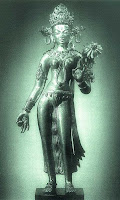
 Non-Chalcedonian churches like the Coptic, have their own celebrations and their religious heads. Copts or Egyptian Orthodox Christians (not to be confused with Coptic Catholics) follow the Julian rather than the common Gregorian calendar (communio.stblogs.org).
Non-Chalcedonian churches like the Coptic, have their own celebrations and their religious heads. Copts or Egyptian Orthodox Christians (not to be confused with Coptic Catholics) follow the Julian rather than the common Gregorian calendar (communio.stblogs.org). In a divine St. Paddy's Day surprise, the Christian pope has died, it has been announced and confirmed by the BBC. (The Christian pope should not be confused with the more famous Catholic pope). Egypt's Coptic Christian Pope Shenouda III passed away at the age of 88, state television announced.
In a divine St. Paddy's Day surprise, the Christian pope has died, it has been announced and confirmed by the BBC. (The Christian pope should not be confused with the more famous Catholic pope). Egypt's Coptic Christian Pope Shenouda III passed away at the age of 88, state television announced.
His Holiness
 From the land of the great ancient Egyptian civilization, the land visited by [Jesus/St. Issa] and the Holy Family, and from the line of renowned predecessors such as St. Mark the Apostle, St. Athanasius the Apostolic, and St. Cyril the Great, comes the author of the renaissance of the Coptic Orthodox Church: H.H. Pope Shenouda III.
From the land of the great ancient Egyptian civilization, the land visited by [Jesus/St. Issa] and the Holy Family, and from the line of renowned predecessors such as St. Mark the Apostle, St. Athanasius the Apostolic, and St. Cyril the Great, comes the author of the renaissance of the Coptic Orthodox Church: H.H. Pope Shenouda III. A distinguished and prominent religious leader, a profound theologian, a gifted preacher, a talented author, a spiritual father, [the Coptic Pope was] a man of God his entire life.
A distinguished and prominent religious leader, a profound theologian, a gifted preacher, a talented author, a spiritual father, [the Coptic Pope was] a man of God his entire life.
 His Holiness was born Nazeer Gayed on August 3, 1923, to a pious Christian family in Egypt. By the age of 16, H.H. was active in the Sunday School movement, which wrought to enrich Christian Education in the Coptic Orthodox Church.
His Holiness was born Nazeer Gayed on August 3, 1923, to a pious Christian family in Egypt. By the age of 16, H.H. was active in the Sunday School movement, which wrought to enrich Christian Education in the Coptic Orthodox Church.
When H.H. graduated from Cairo University, he joined the Coptic Orthodox Seminary, and upon graduation, joined the faculty of the seminary.
 On July 18, 1954, H.H. chose the solitude of the Egyptian desert and the angelic life of [Buddhist-inspired Christian] monasticism over everything else, taking the example of St. Anthony the Great.
On July 18, 1954, H.H. chose the solitude of the Egyptian desert and the angelic life of [Buddhist-inspired Christian] monasticism over everything else, taking the example of St. Anthony the Great.
As a monk, and later a monk priest, H.H. carried the name of the Christian monk and was known as... More
Wisdom Quarterly (COMMENTARY)
 Who knew Christians had a pope, a titular chief of their church? After the Protestant reformation led by Martin Luther, not to be confused with American hero Reverend Martin Luther King, Jr. (who changed his name to be MLK), one would have thought the corrupt practices of the Catholic Church with the head of its holy empire stationed in Rome (in the Holy See to be exact, a separate country in the middle of Rome, Italy) would have all been abolished. But no one told the older Eastern Orthodox pre-schism Christian church.
Who knew Christians had a pope, a titular chief of their church? After the Protestant reformation led by Martin Luther, not to be confused with American hero Reverend Martin Luther King, Jr. (who changed his name to be MLK), one would have thought the corrupt practices of the Catholic Church with the head of its holy empire stationed in Rome (in the Holy See to be exact, a separate country in the middle of Rome, Italy) would have all been abolished. But no one told the older Eastern Orthodox pre-schism Christian church.The Copts of Egypt, like non-Roman Catholic Christians in Armenia, Syria, Israel, and elsewhere in the Middle East, are part of a very ancient Christian tradition. And a corporation, like the Vatican, needs a CEO. That station is filled by the Catholic pope, who we are told is in direct contact with Jesus/Sakka/St. Michael/Indra, the Lord of Lords and King of Kings in Second Heaven. That overseer devaputra ("son of god"), an archangel deity, apparently needs a human liaison.
 Tibet was once a kind of empire -- whose hegemony spread throughout the Himalayas through Bhutan, Nepal, and northern India all the way down to modern Bangladesh (formerly east India). It drew Nazi attention and admiration.
Tibet was once a kind of empire -- whose hegemony spread throughout the Himalayas through Bhutan, Nepal, and northern India all the way down to modern Bangladesh (formerly east India). It drew Nazi attention and admiration.As such it apparently felt a need to organize itself in a sexist, patriarchal hierarchy known as Lamaism. This unique Himalayan form of Buddhism is called Vajrayana, a blend of pre-Buddhist Bon shamanism and latter-day messianic Mahayana Buddhism.
 It focuses not on the historical Buddha but on Maitreya the Buddha-to-come, Kwan the Bodhisattva/Goddess of Compassion, the Taras (deified former queens in wating), crazy-wisdom "saint" Milarepa, lamas and rinpoches (bishops that formed a new professional Tibetan priestly caste like the brahmins of ancient Indian Vedic Civilization Brahmanism, which take their cue from the sky gods enshrined in the ancient Knowledge Books, the Vedas).
It focuses not on the historical Buddha but on Maitreya the Buddha-to-come, Kwan the Bodhisattva/Goddess of Compassion, the Taras (deified former queens in wating), crazy-wisdom "saint" Milarepa, lamas and rinpoches (bishops that formed a new professional Tibetan priestly caste like the brahmins of ancient Indian Vedic Civilization Brahmanism, which take their cue from the sky gods enshrined in the ancient Knowledge Books, the Vedas). Does Islam, which expresses a great deal of respect for women in writing while often treating them atrociously in practice, have a "pope," a universal ayatollah or imam? There is one God, one prophet who supersedes all previous prophets, one book, and yet many schools (Shi'a, Sunni, Sufi...).
Does Islam, which expresses a great deal of respect for women in writing while often treating them atrociously in practice, have a "pope," a universal ayatollah or imam? There is one God, one prophet who supersedes all previous prophets, one book, and yet many schools (Shi'a, Sunni, Sufi...).  Establishment temple Brahmanism and the Catholic Church organize themselves in an apparently heaven (akasha deva loka)-approved hierarchy. This seems to necessitate, as the male members of monastic traditions have interpreted it, a single male member of a special priest or monastic society as its head. And this is why we have popes. Interestingly, however, while Chinese Mahayana Buddhism may select a Panchen or Dalai Lama, and Siberian Buddhism in the former USSR may select/elect a head, but the more patriarchal Theravada Buddhist school never went outside the historical Buddha's teachings to push for a pope or head of the tradition. It certainly had "founding church fathers" (the Theras, "elders"). It certainly systematically discounted its "founding church mothers" (the Theris, senior nuns).
Establishment temple Brahmanism and the Catholic Church organize themselves in an apparently heaven (akasha deva loka)-approved hierarchy. This seems to necessitate, as the male members of monastic traditions have interpreted it, a single male member of a special priest or monastic society as its head. And this is why we have popes. Interestingly, however, while Chinese Mahayana Buddhism may select a Panchen or Dalai Lama, and Siberian Buddhism in the former USSR may select/elect a head, but the more patriarchal Theravada Buddhist school never went outside the historical Buddha's teachings to push for a pope or head of the tradition. It certainly had "founding church fathers" (the Theras, "elders"). It certainly systematically discounted its "founding church mothers" (the Theris, senior nuns).- THERIVADA: Maybe a new school should be originated, not as a schism, but just as an inclusive group of something that should never have been separated on the basis of sexist institutionalization called Therivada, the "The Teaching of the Elders," the elders re-including the elder nuns, senior members of a Sangha, Monastic Order, that was always meant to include them. It is a sexist misrepresentation to say that nuns were subordinated by order of the Buddha as a prerequisite to the ordination of females, as Ayya Tathaaloka's scholarship (regarding the origin story of the Eight Additional Nuns' Rules from the Bhikkhuni Vinaya, the nuns' monastic disciplinary guidelines) shows.
 Theravada Buddhist nuns and Ten Precept Novices in Mandalay, Burma (Sylvain Brajeul/Flickr.com)
Theravada Buddhist nuns and Ten Precept Novices in Mandalay, Burma (Sylvain Brajeul/Flickr.com)
































































































































































































































No comments:
Post a Comment